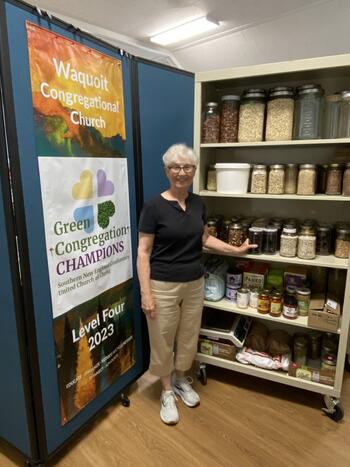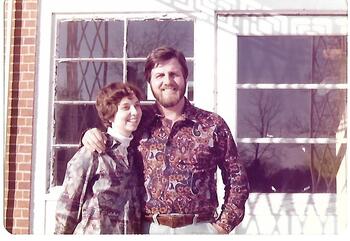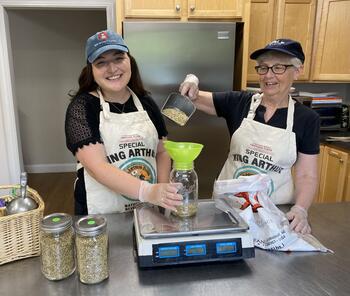By Melissa Kvidahl Reilly
Upon her retirement from full-time ministry in 2016, Janet Smith-Rushton ’78 M.Div. retreated to Waquoit Village, a serene community nestled in the town of Falmouth on Cape Cod—but she hasn’t slowed down. Putting to work the values that defined her time as a minister, she leads the Waquoit Zero Waste Bulk Buying Group, a grassroots initiative that provides access to healthy, sustainable foods in a region lacking fresh and wholesome options.
Faith and formation
 Smith-Rushton grew up in a family environment deeply rooted in faith. Her parents and grandparents—even her great-grandparents—were instrumental in shaping her spiritual life. “I can’t remember a time when faith wasn’t a part of my being,” she says, explaining that it was integrated into everything from bedtime stories to encounters with nature. At the same time, Smith-Rushton’s experience as a Girl Scout laid the groundwork for a lifelong passion for the environment, as she delighted in learning the names of woodland plants and animals, as well as camping in the forest each year. “I recently pulled up a little order of worship we created during a camping trip using an old typewriter,” she recalls with amusement. “Apparently, I was the minister at just 10 years old.”
Smith-Rushton grew up in a family environment deeply rooted in faith. Her parents and grandparents—even her great-grandparents—were instrumental in shaping her spiritual life. “I can’t remember a time when faith wasn’t a part of my being,” she says, explaining that it was integrated into everything from bedtime stories to encounters with nature. At the same time, Smith-Rushton’s experience as a Girl Scout laid the groundwork for a lifelong passion for the environment, as she delighted in learning the names of woodland plants and animals, as well as camping in the forest each year. “I recently pulled up a little order of worship we created during a camping trip using an old typewriter,” she recalls with amusement. “Apparently, I was the minister at just 10 years old.”
She initially pursued a career in education, earning a bachelor’s degree at Northeastern University, but she soon decided to switch course. “I took a Christian education class at Andover Newton Theological School, and I was immediately hooked,” she says. “I knew at that point that I was called into ordained ministry with a specialty in education and that I would attend seminary.”
Action items
Living in the Divinity School’s married student housing, Smith-Rushton encountered a small global village of interesting people who all seemed to have two things in common: thin resources and abundant creativity.
 Students created their own entertainment, including a bluegrass group that performed in the Fatted Calf as well as a men’s baking competition that operated out of Curtis Hall. “Bakers prepared different recipes, and families would gather to savor the aroma and sample the freshly baked bread,” Smith-Rushton recalls, adding that sustainable living was “baked” into just about everything at that time, from the food to the furniture. “One time, a group of friends lugged the heaviest and ugliest sofa from a collection that was languishing in the basement and destined for the landfill,” she says. “After stripping away the upholstery and stuffing, and armed with a vision for the possible, a sewing machine, fabric, and new stuffing, they created a beautiful piece of furniture for their living room.”
Students created their own entertainment, including a bluegrass group that performed in the Fatted Calf as well as a men’s baking competition that operated out of Curtis Hall. “Bakers prepared different recipes, and families would gather to savor the aroma and sample the freshly baked bread,” Smith-Rushton recalls, adding that sustainable living was “baked” into just about everything at that time, from the food to the furniture. “One time, a group of friends lugged the heaviest and ugliest sofa from a collection that was languishing in the basement and destined for the landfill,” she says. “After stripping away the upholstery and stuffing, and armed with a vision for the possible, a sewing machine, fabric, and new stuffing, they created a beautiful piece of furniture for their living room.”
This combined experience of campus living, spirituality, ministry, and sustainability will be instantiated on the YDS campus when the new Living Village residences open in 2025. “I hope this will inspire students to live lightly on the earth,” Smith-Rushton says. (The Yale Club of Cape Cod will host Dean Greg Sterling for a presentation on the project in Falmouth, Mass., on July 13.)
In 1976, Smith-Rushton was ordained as a United Methodist minister. Her subsequent ministry career would span four decades and take her all over Massachusetts and New Hampshire.
During her first appointment as associate pastor, she was introduced to farmers markets and joined a grassroots food co-op operating from a neighbor’s home. Inspired by these experiences, she initiated her own food-co-op during her next appointment, marking the beginning of a lifelong involvement in the local and sustainable food movement. Wherever she went, she infused this passion into her ministry, whether it was starting a community garden or facilitating church work on community supported agriculture (CSA) programs. “When I was ordained, our bishops were clear that we were appointed to serve the church and the community,” she says. “So, while the specific activities depended on the needs of the community and varied from church to church, I was always involved in something sustainable.”
When Smith-Rushton retired in 2016, she and her husband moved to Waquoit. “This area is something of a food desert in that we don’t have a lot of farms and fresh produce nearby,” she explains. The town’s only natural food store had recently closed, and Falmouth lacked a store that sold bulk items and allowed patrons to reuse their own containers to minimize waste. “I was volunteering at a CSA farm, and I realized that right here was this source of really good food,” she says. “Over time, I began to vision with one of the farmers about filling a need for a bulk group.”
Armed with a mission to reduce waste and promote conscious consumption, Smith-Rushton and a dedicated group of volunteers partnered with local farmers and distributors to launch the Waquoit Zero Waste Bulk Buying Group (W.0.W.) in 2019. Not only would this initiative provide the community with high-quality, whole, organic, and healthy foods at bulk or wholesale prices, but it would reduce packaging waste, support local and regional farmers, reduce Waquoit’s carbon footprint, build a sense of community through shared food and work, and redirect food dollars from large grocery chains.
W.0.W. started with about 10 members purchasing basic pantry items like sugar, beans, nuts, and flour. Whatever was left after they split the bounty was packaged for the church’s bulk pantry shelf (available to anyone in the community) or sold at the farmer’s market. “This acquainted the public with the concept—people would say it reminded them of their grandma’s pantry,” Smith-Rushton says. “That outreach was significant because it was how we grew our membership and learned about what kinds of foods our community was most interested in.”
In the five years since its inception, the group has grown to about 30 members. By using compostable brown paper bags and refillable glass jars, they’ve purchased and distributed over 3,000 pounds of food without adding trash or recycling to the local waste stream. And, they’ve diverted nearly $135,000 from the profits of large, multinational corporations and redirected them to small, local businesses and producers. W.0.W.’s offerings have also grown to include rice, quinoa, oats, pasta, nuts, fruit, beans, butter, grass fed organic beef, poultry, milk, eggs, and vegetables; each month’s order is different depending on the members’ needs.
A form of ministry
 Beyond offering the economic and environmental benefits of bulk buying, W.0.W. serves as a hub for the community and a place for connection in unsettling times. During the challenges of the COVID-19 pandemic, when access to food became a pressing concern for many, the group remained steadfast, providing a lifeline for families in need and fostering a sense of solidarity. “What makes this group so wonderful is that it’s designed to serve both the faith community and the broader Falmouth community,” says Smith-Rushton. “Our members come from all walks of life and are wonderful people doing interesting things.”
Beyond offering the economic and environmental benefits of bulk buying, W.0.W. serves as a hub for the community and a place for connection in unsettling times. During the challenges of the COVID-19 pandemic, when access to food became a pressing concern for many, the group remained steadfast, providing a lifeline for families in need and fostering a sense of solidarity. “What makes this group so wonderful is that it’s designed to serve both the faith community and the broader Falmouth community,” says Smith-Rushton. “Our members come from all walks of life and are wonderful people doing interesting things.”
Though officially retired, Smith-Rushton sees this project as an extension of her ministry—a platform to deepen her engagement with the community and advance her commitment to service. “Now that I’m retired from full-time ordained ministry, I have the freedom to be more fully engaged in the community and be a listening presence, to really walk with people in their journey and be present with people where they are,” she says. “Many people are not comfortable in an institutional church, yet lead very deep spiritual lives, have connections to the creator, and have an appreciation for the environment and nature. To be able to share this passion with people has been a gift I’ve enjoyed immensely.”
Melissa Kvidahl Reilly is a New Jersey-based writer and editor who specializes in higher and religious education as well as business-to-business subjects.